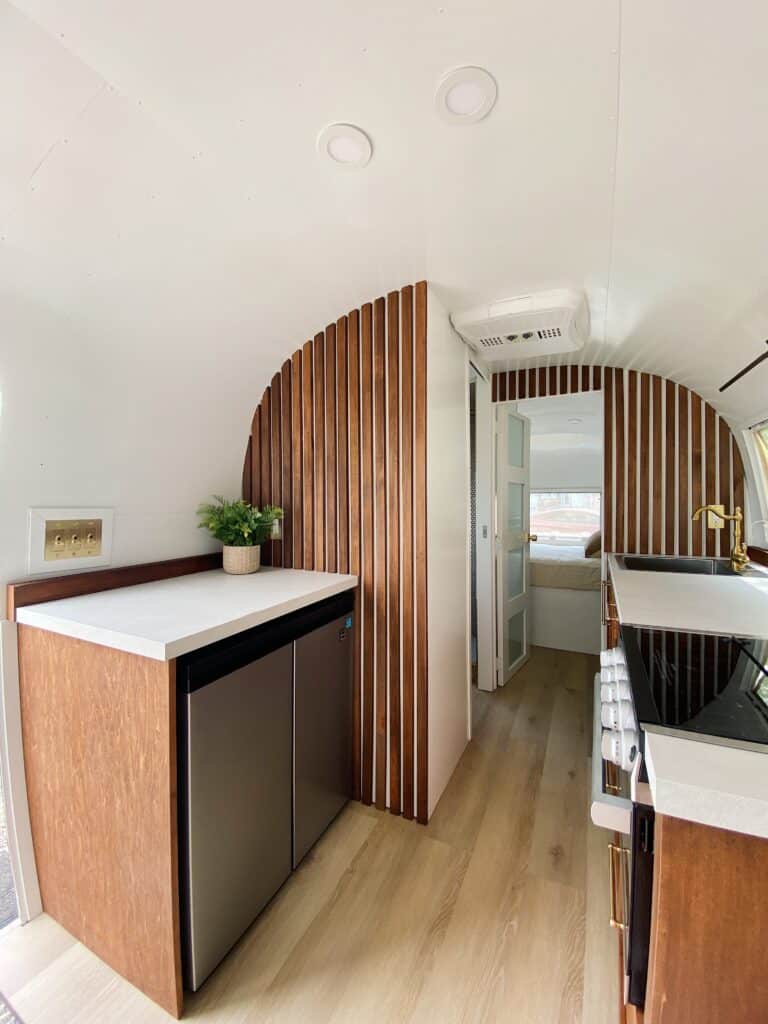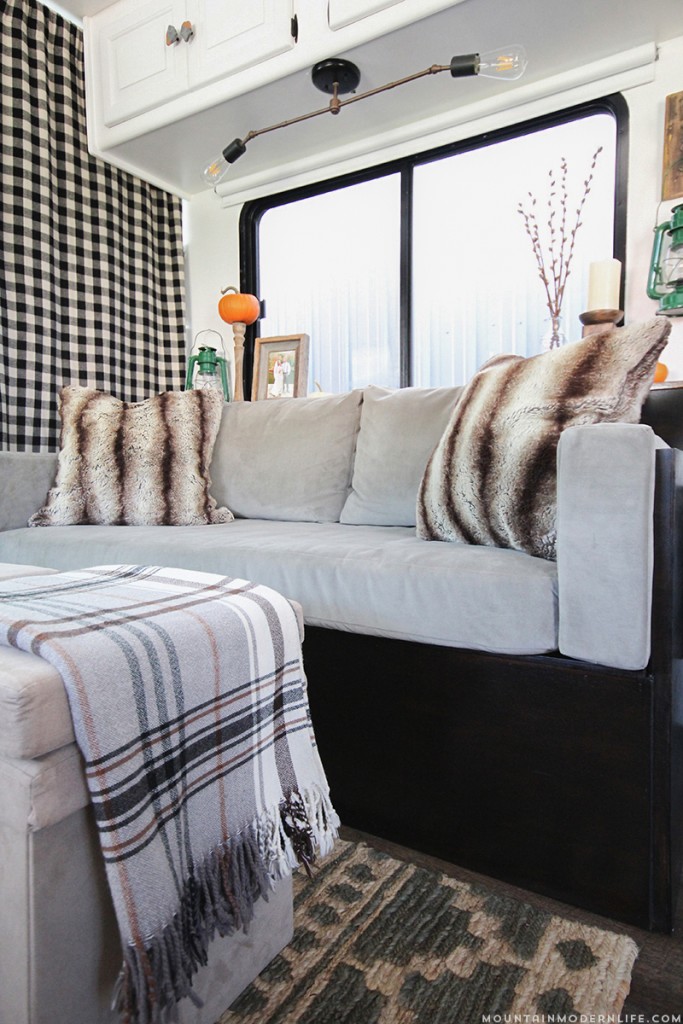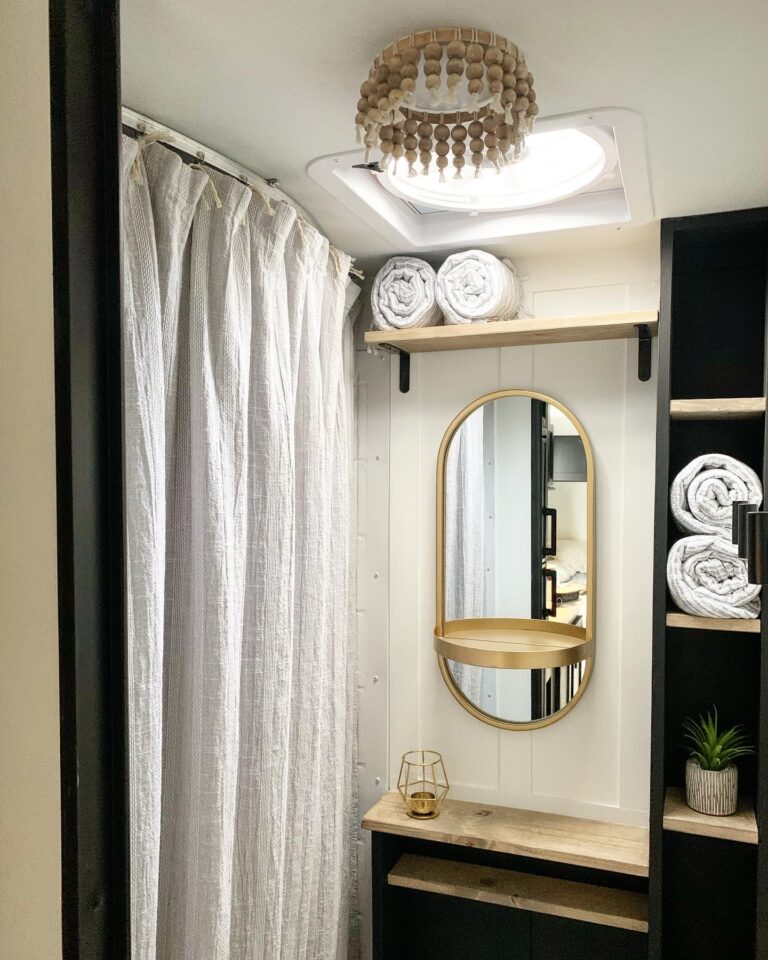Step By Step Guide to Replacing Your RV Awning Fabric
This post may contain affiliate links.
Is your RV awning torn, stained, or worn through? You don’t have to pay someone else to repair it or install a new awning; you can easily do it yourself!
Replacing RV awning fabric is really quite doable as a DIY project, and hopefully this step-by-step guide will help you feel less intimidated about the task of upgrading or repairing your RV awning.
This article is based on an incredibly helpful step-by-step demonstration tutorial put together by RVing couple Kory and Denise of the RV buying resource YouTube channel “Does Size Matter”. They share lots of helpful RV reviews and tips, and I encourage you to follow them on YouTube!
Kory and Denise’s RV awning is a Dometic A&E awning. Many RV awnings are similar, but you should be sure to also check and follow the instructions specific to your RV awning.
The awning fabric they used came from ShadePro.com. ShadePro sells RV awning fabric in a variety of colors and styles as well as different weights and types of material, all of which you can see here.
ShadePro also sells the awning mechanism if your RV doesn’t have an awning and you’re looking to add one. They also offer slide-out awnings and window awnings (and replacement fabric for those), as well as RV awning accessories like sun shades and screen rooms.
In this article, I’ll provide photos and descriptions of all of the steps involved with upgrading an RV awning by replacing the fabric so that you can see exactly what the process looks like.
At the bottom of the article, you’ll find the full video of Kory and Denise’s RV awning replacement tutorial, which has extra tips and additional details.
Tools Needed to Replace Your RV Awning Fabric

The tools needed for this project may vary depending on your specific awning. The tools Kory and Denise used for replacing the fabric of their Dometic A&E awning include:
- Safety Glasses
- RV Caulk
- Vice Grips
- Screwdriver (Phillips or Flat Head)
- Sharpie
- Wire Cutters
- A Nail or Pin to Secure Awning Spring
- Measuring Tape
- Razor Cutter
- Drill
Disassembling the Awning
1. Pull Out the Awning
The first step to replacing your RV awning fabric is to pull the existing awning out. Flip the awning latch into the “out” position and pull out your awning. Next, pull out the stabilizing arms and lock them into place.
2. Lock Springs In Place

The next step is to ensure that the springs are locked into place.
Manual awnings have a tightly-wound spring inside the awning tube that retracts the awning and keeps it in place while driving.
To lock the spring in place on the Dometic A&E awning, first make sure that the awning lever on the front end of the awning is in the “roll down” position.
Once the lever is in the “roll down” position, you need to insert a pin or nail into the other endcap of the awning tube.

The last step to making sure the spring is locked into place is to use a vice grip on the front shaft of the awning tube while disconnecting it from the awning arm.
If you don’t hold this vice grip, the spring can unwind violently and cause damage or physical harm. This is a critical safety step while replacing your awning fabric.

3. Remove Awning Tube from Awning Arms

While holding the vice grip, remove the bolt from the awning arm to release the awning tube on the front end of the RV.
Be sure that you don’t bump the lever out of the “roll down” position. This lever helps keep the spring locked into place.
Once you have the awning tube disconnected from the arm on the front of the RV, prop it up on something sturdy and repeat for the rear of the awning.
4. Unwinding The Spring

Once the awning tube is disconnected from the arms on the RV, manually unwind the spring using a vice grip.
While unwinding the spring, you need to count the revolutions – how many times you go around while unwinding it – because you will wind the new awning the same amount of times.
It is helpful to have two people to do this part, because you need to stick a screwdriver into the cap of the roller tube to keep it from rotating while unwinding the spring.
Once you have the screwdriver in place and the vice grips in a good position to unwind the spring, flip the lever into the “roll up” position.
Make sure you have a firm grip on the vice grip when you unlock this lever, otherwise the spring will unwind rapidly on it’s own. This can be very dangerous.
You will know that the spring is unwound when there is no more tension or pressure on the vice grips.
5. Remove Awning End Cap

Next, you will remove the end cap from the roller tube. Make a small mark with a sharpie on the tube and cap so that you have a reference point to re-assemble it.
Remove the end cap and pull out the awning spring.
6. Remove Awning Roller from Awning Fabric

Once you have the end cap removed, you can slide the awning roller off of the old awning fabric.
7. Remove Awning Arms from RV

Now it’s time to remove the top bracket from the awning arm so that you can pull off the arm and remove the old fabric. This requires unscrewing a couple of bolts and pulling the arm straight off.
8. Removing Old Awning Fabric

After you’ve removed the awning arms, it’s time to remove the awning fabric. If there is a rain gutter on the edge of your awning, you will have to remove it to slide the awning out. Next, there are screws on each end holding the old awning fabric in place. Once you have removed these screws, the old fabric should slide out. This part requires a bit of muscle, but is a fairly simple process.
9. Scrub Out Dirt and Grime

Once you have the old awning fabric removed, it’s a great time to scrub out any dirt and grime that has accumulated near the awning track. It’s also a great time to cover any sharp edges with tape to avoid ripping your new awning fabric. Now it’s time to install your new awning. You can also scrub your awning roller tube to clean off the years of grime.
Putting it Back Together
10. Installing New Awning Fabric

To install your new awning fabric, first slide the new awning fabric into the track on the top of the RV.
11. Re-Installing Awning Arms

Re-install the awning arms and rain spout. It’s a good idea to seal the bolt holes for the awning bracket with RV caulk to prevent any leaks.
12. Re-Installing Roller Tube

The next step is to slide the new awning fabric into the awning roller tube.
The awning fabric has two plastic guides for the fabric and valance. These plastic pieces may need to be cut in order for the awning to be centered on the roller tube. If you have to cut the plastic guides, make sure to leave enough of the guide on to keep the awning fabric secure. You don’t want the fabric to be loose on the tube.

When installing the new awning onto the tube, you will need to have room behind your RV, because you will be pushing the roller tube forward as you slide it onto the new awning fabric. After the awning fabric is on, re-insert the spring and install the awning tube cap.
13. Winding Up the Awning Spring
Now it’s time to wind the awning spring. Put the awning lever back into the “roll-down” position to begin winding the spring back up. The spring should wind up as many times as it was unwound.
14. Attaching Roller to Arms

Re-attach the awning arms to the awning roller tube. Be careful not to bump the awning lever while re-attaching the awning to the arms to avoid unwinding your tightly wound spring.
15. Test Out Your New Awning and Secure in Place

Now that you have the new awning installed on your RV, it’s time to roll it up and see if it works correctly.
You will need to remove the pin from the end of the RV awning that is holding the rear spring in place. Once you have that removed, it’s time to test out your new awning.
If your new awning rolls up correctly, the final step is inserting the set screws on the top of the awning to keep the fabric in place.
Then it’s time to order some cute string lights to hang from your brand new RV awning! 🙂
Video Tutorial from Kory and Denise
Here’s the full video of the awning replacement process from RV bloggers & YouTubers Kory and Denise which they graciously allowed me to write about for this article. Be sure to follow their YouTube channel for more great tips and tutorials!










Ah yes, this is something we’re going to have to do sometime in the near future too…Thanks for the info!
We will be needing to do this soon on our RV and this was incredibly helpful! Thanks for the step by step process!
Thank you for writing this, it is really useful for RV beginners like me!